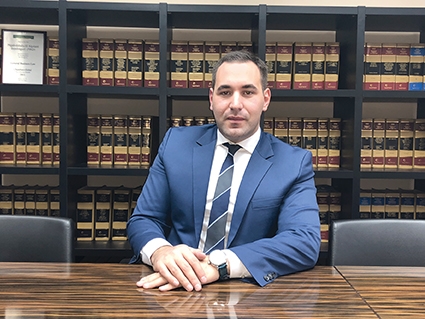Public-Private Partnerships: an Effective Legal Tool for Attracting FDI
In May 2018, the Parliament of Georgia adopted a Law on Public-Private Partnerships (‘PPP Law’) that provides a legal framework for co-operation between the public and private sectors when developing public infrastructure or providing municipal services.
The PPP Law was, however, only enacted in late August, when the government adopted a series of bylaws providing detailed rules and procedures for designing and carrying out PPP projects, including the process of selecting private partners.
To find out more, GEORGIA TODAY spoke with Sandro Samadbegishvili, a lawyer with the firm of Mgaloblishvili Kipiani Dzidziguri (MKD) who took part in the drafting of the PPP Law and is currently researching a doctoral thesis on various PPP models.
MKD has been at the forefront of the Georgian legal market for over two decades, during which it has become a strong, highly competitive and well-respected Georgian law firm capable of providing a wide range of legal services to its clients. MKD has advised foreign investors involved in several PPP projects that have already been implemented in Georgia, and has contributed to leading international legal publications on Georgia’s PPP legal framework.
What are public-private partnerships? To what fields of business and the economy do they apply?
The definition of what constitutes a PPP varies from one jurisdiction to another, but generally speaking the concept involves a range of possible co-operative agreements between public and private entities that are usually applied to infrastructure and to the provision of municipal services. The public partners are government agencies such as ministries, local authorities or state-owned enterprises, while the private partners can be local or international investors with technical and financial expertise relevant to the project.
Well-designed PPPs typically divide tasks, obligations and risks among the public and private partners, allocating them in the most optimal manner by recognizing that the public and private sectors enjoy certain advantages relative to each other in terms of performing specific roles and functions. The government’s contribution to a PPP may take the form of a transfer of assets or ‘in-kind’ contributions that support the partnership or other commitments (e.g. building a road to the PPP project site). The government also provides social responsibility, environmental awareness, local knowledge and an ability to mobilize political support around the project. The private sector’s role in the partnership is usually to employ its expertise of a particular field, its commercial knowledge, its management skills and its capacity for innovation in order to run the project as efficiently as possible. In most cases, the private partner also contributes to the project’s partial or total financing by attracting investment capital.
The structure of public-private partnerships is designed to allow risks to be allocated in the most optimal way possible: risks are attributed to the partner who is best able to manage them and is thus capable of minimizing costs while improving performance.
Worldwide, PPPs have been completed in sectors as diverse as power generation and distribution, public infrastructure (e.g. highways, railways, ports, airports), healthcare (e.g. hospitals) and municipal services, including public transport, water supply, solid waste and waste-water management, and even sports infrastructure.
Why was Georgia’s adoption of a PPP Law an important step?
Despite being a country focused on attracting FDI, until recently Georgia had no clear or comprehensive legal framework in place to regulate partnerships bet ween the government and foreign investors. In the absence of such a framework, the Georgian government would simply co-operate with companies on a purely contractual basis. As examples, we can cite the ‘build, operate and transfer’ (BOT) agreement between ‘United Airports of Georgia’ and ‘TAV Urban Georgia’ relating to Tbilisi’s international airport (which was amended in 2015 after 10 years of operation), or the crucial construction and development of Georgia’s future deep-water port at Anaklia on the Black Sea. According to the request for expressions of interest that was issued in 2014, ‘the government intends to select an investor to develop the port on a build, operate and transfer (BOT) basis, pursuant to an agreement to be entered into with the selected investor.’
But such practice presents substantial disadvantages: both the way in which the project was identified as well as the criteria and procedure for selecting partners were only vaguely defined; some of the major terms were agreed on a case-by-case basis instead of by statute; and certain conditions, which should have been governed by law, remained beyond the scope of any regulation. For all these reasons, the parties were compelled to give a legal qualification to their contractual relations according to the legal concepts that existed at that time, and which were still very different from the concept of a PPP. For example, BOT agreements were considered to be similar to the notion of ‘right to build’ as set out in Georgia’s Civil Code—but the latter notion, according to which the state owns the land upon which the private party has the right to build, is obviously rather distinct from PPP, and such qualification led to contrasting legal and fiscal results.
Foreign investors and international financial institutions such as the EBRD and ADB underlined the urgency of the need for Georgia to develop modern concessions and a PPP legal framework in order to create a more stable and predictable business environment. Back in 2015, the EBRD (one of the initiators of the newly adopted PPP Law, providing technical and financial assistance in the process) noted that Georgian legislation only partly complied with international PPP standards, and that the purpose of developing relevant policy and legal frameworks was to incentivise private sector participation in infrastructure projects. The same was mentioned in the explanatory note to the draft PPP Law initiated by the government of Georgia in October 2017.
Does the PPP Law effectively address all these challenges?
As the Law was enacted only two months ago, it would be premature at this stage to judge its effectiveness, but despite the lack of practice it can now be firmly stated that Georgia’s regulatory framework is in full compliance with international standards and is quite similar to equivalent legislation in many European states. This has already been confirmed by the EBRD’s very recent ‘Public-Private Partnerships Laws Assessment’, according to which ‘Georgia’s new PPP Law… should significantly improve its PPP framework and make it more compliant with internationally accepted standards and best practices.’
Let us briefly examine the Law’s various elements and illustrate the novelties it introduces.
Firstly, the new PPP Law permits both concessional and non-concessional partnerships, meaning that a private partner can either collect funds directly or indirectly from the end consumers of the public (municipal) services it is providing. Alternately, a private partner can be compensated by its public partner for these services or the public infrastructure it has created.
Secondly, the law defines an explicit series of criteria for PPP projects. These should be signed for at least five years and be worth at least two million dollars, and shall involve the provision of public (municipal) services by a private partner or the operation and/or creation and maintenance of public infrastructure. In order to ensure that risks and obligations are allocated optimally, PPPs shall be fully or partially financed by private partners.
Importantly, the PPP Law and its bylaws provide clear guidance on the rules related to project identification, initiation and preparation, as well as detailed procedures for the selection of private partners, the stages of project implementation, monitoring and even post-implementation relations. Interestingly enough, projects may be initiated not only by the government but also by potential private investors. This rule mainly concerns the energy sector, which the Law recognizes as one of the most strategically important. In this context, the Law also envisages the possibility of granting investors long-term guaranteed purchase agreements. The energy sector also enjoys some exemptions from general rules, e.g. only PPP projects in the energy sector can be negotiated directly with a single private partner, thereby skipping the public tendering and evaluation procedure. At the same time, for energy projects larger than 100MW, the initiation process shall include a feasibility study to be carried out by an independent company.
In conclusion, the PPP Law incorporates all the elements needed for the comprehensive and effective regulation of relations between the state and investors. Accordingly, the newly created legal framework adequately addresses all the requirements of all major stakeholders (the government, the private sector and financial institutions) and will promote investment in Georgia’s infrastructure and better public services.











